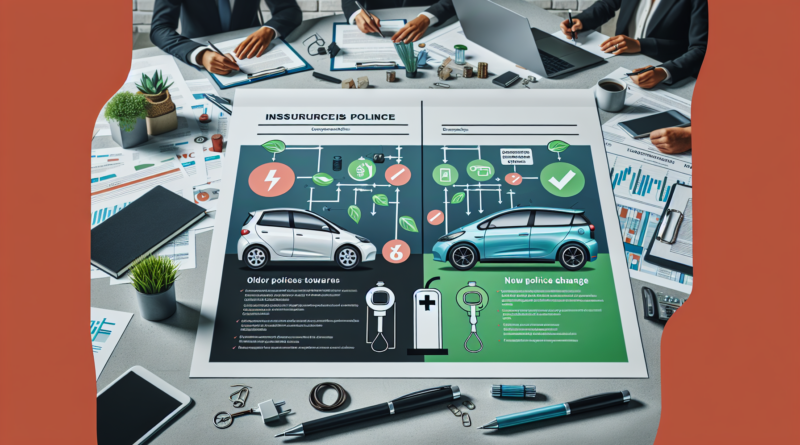Future of Car Insurance with EVs
The automotive industry is undergoing a significant transformation with the rapid adoption of electric vehicles (EVs). As more consumers shift towards environmentally friendly transportation options, the landscape of car insurance is expected to evolve. This shift is driven by technological advancements, government incentives, and a growing awareness of environmental issues. With EVs becoming more mainstream, insurance companies must adapt their policies to accommodate the unique characteristics and risks associated with these vehicles.
Impact on Insurance Premiums
One of the most immediate changes in car insurance policies due to the spread of EVs is the adjustment of insurance premiums. Traditional factors such as engine size and fuel type are becoming less relevant. Instead, insurers are focusing on new criteria like battery capacity, charging infrastructure, and the cost of repairs. **EVs often have higher initial purchase prices but lower maintenance costs**, which can influence premium calculations. Additionally, the integration of advanced safety features in EVs, such as autonomous driving capabilities, may lead to reduced accident rates, potentially lowering premiums for policyholders.
New Coverage Options
As the demand for EVs grows, insurance companies are introducing specialized coverage options tailored to the needs of EV owners. These include coverage for battery replacement, charging station damage, and even roadside assistance specific to EVs. **Such tailored policies ensure that EV owners are adequately protected against unique risks**, providing peace of mind and encouraging more consumers to make the switch to electric.
Challenges in Risk Assessment
The transition to electric vehicles presents challenges in risk assessment for insurers. **The lack of historical data on EVs makes it difficult to accurately predict risks and set premiums.** Insurers must rely on emerging data and collaborate with automotive manufacturers to understand the nuances of EV technology. Additionally, the rapid pace of innovation in the EV sector means that insurers need to stay informed about new developments and adjust their risk models accordingly.
Adapting to the EV Revolution
The spread of electric vehicles is reshaping the car insurance industry. Insurers must adapt by developing new risk assessment models, adjusting premiums, and offering specialized coverage options. By embracing these changes, insurance companies can better serve the growing number of EV owners and remain competitive in a rapidly evolving market.
Telematics technology is playing an increasingly important role in the insurance industry, particularly with the rise of EVs. **Telematics devices collect data on driving behavior, which insurers can use to offer usage-based insurance (UBI) policies.** These policies reward safe driving habits with lower premiums, providing an incentive for EV owners to drive responsibly. As telematics technology becomes more sophisticated, it will enable insurers to offer more personalized and accurate pricing models.
Environmental Incentives
Governments around the world are implementing policies to encourage the adoption of electric vehicles, including tax incentives and subsidies. **These incentives not only make EVs more affordable but also influence insurance policies.** Some insurers are offering discounts to policyholders who drive EVs, aligning their offerings with government initiatives to promote sustainable transportation. This trend is expected to continue as more countries commit to reducing carbon emissions and transitioning to greener energy sources.
The Future of Claims Processing
The integration of advanced technology in electric vehicles is also transforming the claims processing landscape. **With features like autonomous driving and real-time data collection, insurers can streamline the claims process and reduce fraud.** For instance, in the event of an accident, data from the vehicle’s sensors can provide accurate information about the incident, enabling faster and more efficient claims resolution. This technological advancement not only benefits insurers but also enhances the customer experience by reducing the time and effort required to process claims.
Embracing Technological Advancements
The future of car insurance is intertwined with technological advancements in the automotive industry. By leveraging telematics, autonomous driving data, and real-time analytics, insurers can enhance their offerings and improve customer satisfaction. Staying ahead of these trends is crucial for insurers to remain relevant in the evolving market.
To effectively adapt to the changes brought about by electric vehicles, insurers are increasingly collaborating with automakers. **These partnerships allow insurers to gain insights into the latest EV technologies and better understand the associated risks.** By working closely with manufacturers, insurers can develop more accurate risk models and offer competitive premiums. Additionally, such collaborations can lead to innovative insurance products that cater specifically to the needs of EV owners, further driving the adoption of electric vehicles.
Conclusion
The spread of electric vehicles is ushering in a new era for the car insurance industry. As insurers navigate this transition, they must embrace innovation and adapt their policies to meet the evolving needs of consumers. **By focusing on new risk assessment models, specialized coverage options, and technological advancements, insurers can successfully navigate the challenges and opportunities presented by the rise of EVs.** The future of car insurance is bright, with the potential for more personalized, efficient, and environmentally conscious offerings that align with the global shift towards sustainable transportation.


